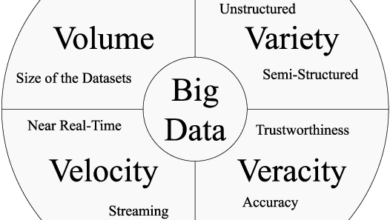Big Data Dangerous: Identifying Its Potential and Perils5

Big Data Dangerous In the digital age, big data has become an essential element of innovation, propelling innovations across numerous industries. Its ability to manage massive data quantities has created previously unimaginable opportunities and transformed the way businesses, governments, and the healthcare industry operate. However, there is a universe of potential dangers hiding beneath the surface of this technological marvel that must be properly taken into account.
The Allure and the Risks
Unveiling the Power Play
Big data Dangerous , which is frequently seen as a game-changer, gives organizations the ability to gain knowledge and make wise choices. Its aptitude for pattern detection and predictive analysis boosts productivity and gives it a competitive edge. From personalized marketing strategies to optimizing supply chains, the advantages seem boundless.
The Underlying Risks
However, the sheer amount and sensitive nature of the data gathered present serious hazards.Privacy breaches are increasing in frequency as personal data becomes more valuable. A sobering reminder of the potential for abuse is provided by the Cambridge Analytica affair, which shows how targeted data exploitation can be used to sway public opinion. Moreover, concerns regarding data theft and security breakdowns are raised by the vulnerability of centralized data centers to cyberattacks.

The Ethical Conundrum
Privacy Predicaments
Protecting privacy in a data-driven world remains a complex challenge. As data collecting increases, moral distinctions become more hazy. When users are frequently ignorant of the amount to which their data is being collected and used, the concept of consent becomes hazy. An urgent ethical conundrum arises when convenience and privacy are traded off.
Bias and Discrimination
Another peril lies in the inherent biases embedded within datasets.In important areas like healthcare, banking, and employment, biassed data can aggravate inequalities by supporting societal stereotypes and discrimination. If big data analytics algorithms are not carefully tuned, they may inadvertently reinforce these prejudices and widen social gaps.
Navigating the Path Ahead
Regulatory Measures
Global governments are struggling to determine if extensive laws are necessary to reduce the risks related to big data dangerous. Tougher data protection regulations, such as the GDPR in Europe, are designed to preserve people’s right to privacy and make businesses answerable for ethical data processing. But implementing these laws all throughout the world continues to be extremely difficult.
Technological Safeguards
Blockchain, decentralized systems, and encryption innovations present promising paths to strengthen data security. The implementation of strong encryption techniques and decentralized data storage mechanisms has the potential to reduce the susceptibility of centralized repositories to cyber assaults.
Embracing Responsible Data Practices
Accountability and Transparency
It is critical to cultivate an accountability and transparency culture within institutions and organizations. Rebuilding trust and promoting ethical data usage practices can be accomplished by being transparent about data usage regulations and giving users more control over their information.Ethical Algorithm Developmentg disparities in crucial domains like healthcare, finance, and employment. The algorithms driving big data analytics, if not calibrated meticulously, can unwittingly reinforce these biases, exacerbating societal divides.Algorithm biases must be addressed with deliberate effort. More equal results can be achieved by embracing diversity in data collecting and improving algorithms to identify and correct biases.
The Positive Outlook: Harnessing Big Data for Good
It is important to recognize the benefits that big data can provide even with all of its hazards and limitations. Because of its potential to revolutionize healthcare through the provision of tailored medicines, disease prediction and prevention, and efficient resource allocation, there is hope. Furthermore, by assisting in the development of proactive plans and the making of well-informed decisions, big data analytics can play a critical role in catastrophe management and climate change mitigation.

Conclusion
Big data dangerous has enormous potential for innovation and appeal, but if it is allowed to grow out of control, there are serious risks. In order to mitigate these risks, companies, individuals, and policymakers must work together. Adopting moral data practices, placing a high value on privacy, and taking advantage of technology developments can help create a future in which big data’s power is used responsibly and its advantages outweigh its drawbacks.




